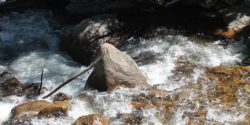Happy World Listening Day! It’s a day set aside to do some deep listening wherever you are. Pull out your earbuds, stash your phone away, and take a walk through your neighborhood and listen to the world around you.
I remember walking my daughter to school one day when she was a preschooler and she looked up to the trees, saying, “listen to that beautiful music.” She was talking about the birds singing overhead and I was struck by the fact that as an adult, I had ceased to think about bird noises in the same way that a child does. And she was right. It was beautiful music.
A few years later when we were walking to her elementary school, we crossed a street when road work was taking place. My daughter turned to me and relayed that the jackhammer sounded like something that would be played on KFJC, the college radio station where I DJ. That time I was impressed, as it made me realize that she also recognized that noise could be music.
As I make my way through the city, it saddens me to see so many people glued to devices; muting out the world around them. We all learn so much when we observe and listen to the world around us; which is part of the reason why I think World Listening Day is such a wonderful project.
Additionally, this year’s theme, “Sounds Lost and Found” is in keeping with my own passion for history and archives. According to organizer World Listening Project:
World Listening Day 2016’s theme, ‘Sounds Lost and Found,’ calls on reminiscing, listening and observing what changes in our soundscapes have occurred in recent decades—be it language, nature, technology, music or even silence itself. For ‘Sounds Lost and Found,’ we invite you to dig into crates of vinyl and cassettes, dive into digital archives, and engage deeply with memories and unheard languages to rediscover or identify these ‘lost sounds.’ In doing so, ‘Sounds Lost and Found’ hopes to spotlight the need for effective and accessible conservatory efforts to be implemented to preserve some of these sounds—whether those efforts include archival projects, changing our daily practices or supporting the preservation of indigenous languages and engaging with the keepers of and archiving fading oral traditions where that seems impossible. We can protect and celebrate sounds whose vitality can be vulnerable and fragile.”
Whether you opt to listen to vintage radio, a cylinder recording, the sounds in a National Park, the rumble of nearby trains, or live music; enjoy the act of listening. I know I will.



